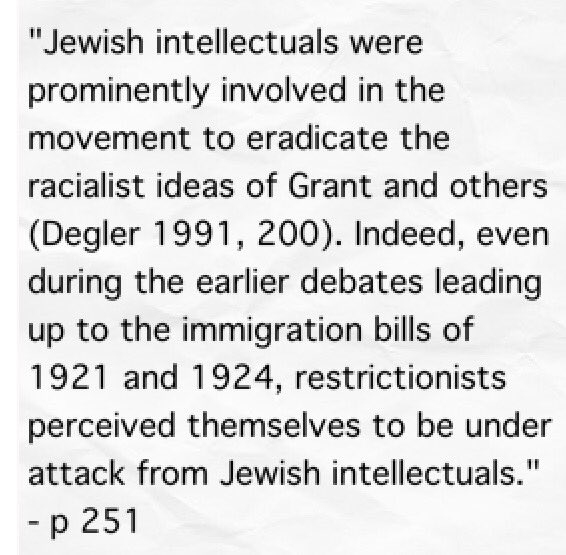
1/ “One aspect of the Jewish interest in cultural pluralism in the United States has been that Jews have a perceived interest that the United States not be a homogeneous Christian culture.” - p 253
2/ “As Ivers (1995, 2) notes, ‘Jewish civil rights organizations have had an historic role in the postwar development of American church-state law and policy.’” - p 253
3/ “In this case the main Jewish effort began only after WWII, although Jews opposed linkages between the state and the Protestant religion much earlier.” - p 253
4/ “For example, Jewish publications were unanimous in their opposition to Tennessee’s law that resulted in the 1925 Scopes trial in which Darwinism was pitted against religious fundamentalism.” - p 253
5/ “The Jewish effort in this case was well funded and was the focus of well-organized, highly dedicated Jewish civil service organizations, including the AJCommittee, the AJCongress, and the ADL.” - p 253
6/ “It involved keen legal expertise both in the actual litigation but also in influencing legal opinion via articles in law journals and other forums of intellectual debate, including the popular media.” - p 253
7/ “It also involved a highly charismatic and effective leadership, particularly Leo Pfeffer of the AJCongress: ‘No other lawyer exercised such complete intellectual dominance over a chosen area of law for so extensive a period - as an author, scholar, public citizen...
8/ ...and above all legal advocate who harnessed his multiple and formidable talents into a single force capable of satisfying all that an institution needs for a successful constitutional reform movement...
9/ ...That Pfeffer, through an enviable combination of skill, determination, and persistence, was able in such a short period of time to make church-state reform the foremost cause with which rival organizations associated the AJCongress illustrates well the impact that...
10/ ...individual lawyers endowed with exceptional skills can have on the character and life of the organizations for which the work.’” - p 253-254
11/ “Similarly, Jews in nineteenth-century France and Germany attempted to remove education from control by the Catholic and Lutheran churches respectively, while for many gentiles Christianity was an important part of national identity...” - p 254
• • •
Missing some Tweet in this thread? You can try to
force a refresh









